Group Meeting: A program where participants that share interest can meet and talk. You can either propose a theme and host a meeting or participate in meetings that you are interested in. Any TPAM registrant can host a meeting (see “Registration”). Reservation not required for participation in the meetings.
2.11 Wed 11:30 – 17:00
2.12 Thu 11:30 – 17:00
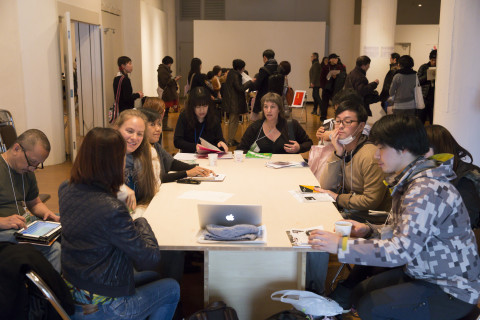
“Table” is for a small and intimate meeting with up to 12 participants and host(s).
“Room” is equipped with a video system and an English–Japanese consecutive interpreter supports your presentation, with up to 30 participants.
| Host registration fee | Guest particiation | Capacity | Services offered | |
| Table | ¥6,000 / 30 min. (up to 2 units = 1 hour) |
Admission free (reservation not required) |
12 | A table and chairs Meeting theme translation and dissemination |
Room | ¥17,000 / 30 min. (up to 2 units = 1 hour) |
30 | Exclusive use of a meeting room w/ table and chairs) Meeting theme translation and dissemination Video system, microphone, English–Japanese consecutive interpretation |
• To register as a host, you need to register for TPAM first. You will have the access to your ‘MyPage’ where you can apply Group Meeting Host Registration.
1st deadline: 1.15 Thu
Final deadline: 2.2 Mon 23:59 (Japan Standard Time)
• Meeting information that will have been registered by the 1st deadline will be on the website, program booklet and timetable. Registrations after that will be on the website and timetable.


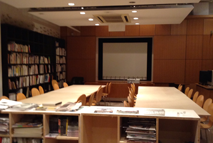
“Room”
2.11 Wed 11:30-12:00
The subsidy programs of Arts Council Tokyo
Room
Language: Japanese with English interpretation
Host: Shoko Sano,Michimoto Sato (Arts Council Tokyo [Tokyo Metropolitan Foundation for History and Culture])
Arts Council Tokyo supports arts organizations based in Tokyo in an annual and a long-term (up to three years) program. We would like to introduce these programs, which happen to be inviting applications during the TPAM period, and explain the changes in the application guideline that were made this season. We would also like to meet with international presenters aiming for future international networking.
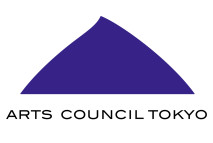
The Supporting Activities of Asahi Group Arts Foundation
Table 1
Language: Japanese
Host: Yoshinobu Takeda (ASAHI GROUP ARTS FOUNDATION)
Asahi Group Arts Foundation supports excellent artistic activities and organizations that promote such activities, aiming to develop artistic and cultural creativity and to enliven local communities, encourage international exchange and join forces with diverse social sectors through artistic and cultural creativity, in order to contribute to the realization of creative and affluent civil society through comprehensive support for the arts and culture. We would like to introduce the supporting programs of ours.

Bring China and the world together through the performing arts
Table 2
Language: English
Host: Zhu Miyi,Zhang Weina (Ping Pong Productions)
Headquartered in Beijing, Ping Pong Productions is a cultural exchange organization that develops and facilitates innovative exchange projects, professional performing arts tours and creative collaborations between Chinese and international artists, scholars and audiences in China and worldwide. This year at TPAM, we will introduce some of the most exciting contemporary Chinese performing artists we have been working with, and we look forward to meeting colleagues from around the Asia region and beyond to share experiences and best practices and to discuss opportunities and proposals for future collaborations as well as tours of Chinese artists to your regions.

Singaporean theatre and collaboration: the current situation, policies and platform
Table 3
Language: Japanese
Host: Ken Takiguchi (Research fellow, National University of Singapore / Ex-management council member, Necessary Stage)
Singapore celebrates the 50th anniversary of the foundation of the nation this year and aims to become the “arts hub” of Asia. Various policies have been put into practice, and international collaborations have actively been carried out. However, there are also contradictions and problems. I would like to report the current situation of Singaporean theatre, seen through the eye of a dramaturge and coordinator who worked there. I would also like to talk about platforms for cooperative work including the outline of M1 Singapore Fringe Festival that the theatre company Necessary Stage, to which I had belonged, has been organizing every year.

Amrita Performing Arts: A Journey in Contemporary Dance in Cambodia
Table 4
Language: English
Host: Rithisal Kang (Amrita Performing Arts)
Founded in 2003 to contribute in the revival and preservation of Cambodian traditional performing arts, Amrita has shifted into a contemporary dance company in Cambodia, responding to the creative drives of a new generation of Cambodian artists. Through international collaborations, these artists have been nurtured to explore their own movements and vocabulary. In late 2013, Contemporary Dance Platform was established to enable them to experiment and create their own creative voices in Cambodia’s burgeoning art scene.
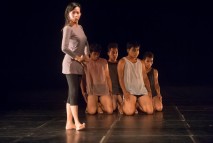
2.11 Wed 12:10-12:40
The future of culture dissemination: what is “hand-made” and “open” Tokyo culture?
Room
Language: Japanese with English interpretation
Host: Ryuichiro Mori (Tokyo Metropolitan Foundation for History and Culture, Tokyo Culture Creation Project Office)
Tokyo Culture Creation Project, which the Tokyo Metropolitan Government and Tokyo Metropolitan Foundation for History and Culture started in 2008 to “create and disseminate culture from Tokyo,” has organized diverse festivals, projects for kids and youth and regional art projects in cooperation with cultural organizations and arts non-profits. In this Room, we would like to introduce latest examples and tendencies of our projects and discuss missions regarding cultural dissemination and how to open cultural resources. We look forward to exchanging thoughts with those who engage in public relations and diffusion at cultural facilities and organizations.
![]()
About ACC fellowship program
Table 1
Language: Japanese
Host: Ritsu Yoshino (Asian Cultural Council (ACC))
ACC’s fellowship program was founded in 1963 to support the international cultural exchange through artists and art professionals in the United States and Asian countries. We would like to introduce the outline of this fellowship grant and the experience through the program.
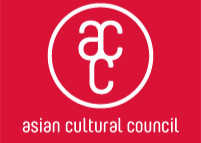
Keep PACE with Japan and the possibilities of international cooperation with Czech republic and Slovakia
Table 2
Language: English
Host: Eliska Cerna (Arts and Theatre Institute, Prague)
Members of Czech and Slovak delegation will introduce the individual projects they work on during the group meeting. Jakub Hora from puppet Alfa Theatre, Eva Kesslová from BERG Orchestra, Viliam Dočolomanský from theater studio Farm in the Cave, Šárka Ondrišová from the elledanse Dance and Theatre School, a dancer Radoslav Pivovarči and a choreographer and dancer Petra Fornayová are also open to international cooperation as well as Arts and Theatre Institute, Prague which offers residences for artists. Following the group meeting, the visitors will be invited to the BankART Mini space to hear another presentation related to PACE, and learn about the performing arts in V4 countries (Czech Republic, Slovakia, Hungary, and Poland). The presenters will be: Marcin Jacoby (Project Asia Manager, Adam Mickiewicz Institute, Poland), Miroslava Kovářová (Artistic Director, Bratislava in Movement, Slovakia), Gábor Pintér (Program Curator/Coordinator, Parallel Foundation, Hungary), and Jana Svobodová (Artistic Director, Akcent Festival / Archa Theatre, Czech Republic). Supported by the Japan Foundation, Budapest.
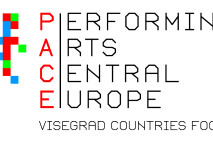
Tie-up program of OWLSPOT
Table 3
Language: Japanese
Host: Hiromi Ozaki,Masashi Kishimoto,Ayumi Nakagawa (OWLSPOT theater (Toshima performing arts center))
OWLSPOT annually selects performances by prospective artists and companies that rented the theater as tie-up programs to cultivate young talents. We would like to explain how to use OWLSPOT and the benefits of the tie-up program to those who want to raise levels of their activities and bring their performances a larger venue.
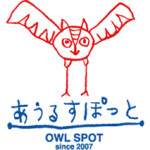
About Unique Approaches of International Theater Festival OKINAWA for Young Audience
Table 4
Language: Japanese (and English in compliance with participants’ wishes)
Host: Nao Miyauchi, Mana Yumii (International Theater Festival OKINAWA for young Audience)
International Theater Festival OKINAWA for Young Audience, which officially started in 2005, aims to be the place of cultural exchange across borders and languages. The festival not only invites exquisite productions for children and adults from around the globe, but also has developed unique approaches as a festival. This meeting will include a presentation of one of the festival-led international co-productions: The Wolf and the Goat (Japan/Italy) which will have a revival this year, and an introduction to ATYA [Asian Alliance of Theatre Festivals for Young Audiences] which started in 2007 and Okinawa currently acts as the chair.

2.11 Wed 12:50-13:20
International exchange projects of OWLSPOT
Room
Language: Japanese with English interpretation
Host: Masato Kishi,Hiromi Ozaki (OWLSPOT theater (Toshima performing arts center))
We would like to introduce the international exchange projects including not only performances but also workshops that we have carried out, as well as “SOMA Project” directed by Fabien Prioville that is presented in summer 2015, future plans and productions that are ready for international touring.

Possibility of connecting the street (performance) and theaters
Table 1
Language: Japanese
Host: Kamimaro (ASAKUSA performance place)
We have been exploring the possibility of the city, theaters and street performance since 2010. To have performing arts flourish again in the Sixth District of Asakusa, the area that used to be the biggest show business area in Japan, we seek liaison between shopping districts, theaters, streets and street performance to revive the city. We would like to talk about our approaches and activities in the four years, companies’ advantages and disadvantages of going out to the street, and proposals for making theaters cultural platforms in the city and to present the possibility of new methodologies and culture that make use the street to those who are involved in city planning, theaters and companies.
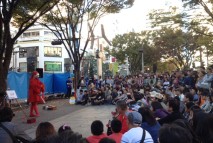
Visiting Fellows / International Program
Table 2
Language: English
Host: Taro Inamura (The Saison Foundation)
Visiting Fellows gives opportunities for artists and arts managers to research the contemporary performing arts scene in Japan. At the table, we will explain the detail of the program. Not to be missed for those having interests in artist-in-residence programs, as well as international programs.
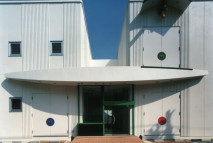
Meeting for young performing arts managers
Table 3
Language: Japanese
Host: Masashi Nomura(Okinawa Prefectural Foundation for cultural promotion, Komaba agora theater, Seinendan ..etc.)
The host, who has been involved in young and middle-rank theatre makers as manager or dramaturge and also in improvement of creative environment at Okinawa Prefectural Foundation, Komaba Agora Theater or Asahi Art Square, would like to casually talk with young performing arts managers at this table. He would like to listen to the participants and discuss how to “use one’s own resources.” Consultation also available.
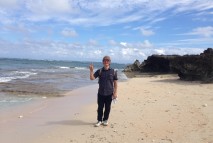
Ansan Street Arts Festival
Table 4
Language: Korean with Japanese interpretation
Host: Jong – Yeoun Yoon (Ansan Street Arts Festival / Ansan Cultural Foundation)
Ansan Street Arts Festival is an annual event held in public spaces of Ansan, Korea with various types of arts including street theatre, circus, installation, media performance and sound performance, established in 2005. The main purpose of the festival is to be the platform of presenting and producing the world’s representative street arts by sharing them with the public in Korea.At this table, i would like to talk about the outline of the festival, and its circumstances.
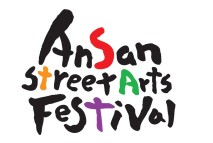
2.11 Wed 13:30-14:00
Call for a campaign for doubling the cultural budget
Room
Language: Japanese with English interpretation
Host: Kishi Masato (Owlspot theater (Toshima Performing Arts Center))
The cultural budget of Japan is about 100 billion yen, 0.12% of the general account and 803 yen per person. In France it is 481.7 billion yen, 0.86% and 7,579 yen per person. In Korea 138.9 billion, 0.79% and 2,932 yen per person. Let’s double our cultural budget toward the 2020 Olympic Game cultural programs and make Japan brighter and more energetic! We call for a campaign for doubling the cultural budget that involves the performing arts sector — companies, theaters and presenters — and makes use of performance flyers.

Connecting with Malaysia
Table 4
Language: English
Host: Izan Satrina (My Performing Arts Agency (MyPAA)), JS Wong (Damansara Performing Arts Centre (DPAC))
What does a Southeast Asian country like Malaysia has to offer in the performing arts? Plenty! Connect with us and discover the opportunities available for the international creative community.
MyPAA is a privately owned arts agency with the express aim of supporting the continuing development of artistic and cultural efforts in Malaysia, by facilitating mutually beneficial collaborative partnerships between the public and private sectors and the creative arts industry, for the benefit of everyone involved in the making and appreciation of the arts.
DPAC is an organization which dedicates itself to promoting the arts in Malaysia via appreciating, learning and practicing the arts. DPAC aims to enhance public awareness on the importance of art-forms which enrich our lives which shapes today’s world.
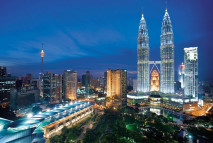
Anna Mülter presents Sophiensæle and Tanztage Berlin
Table 1
Language: English
Host: Anna Mülter (Sophiensæle)
The Sophiensæle is one of the most important locations for independent dance- and theatre-production in Germany. Artists from Berlin, as well as national and international artists produce and present their works in the three performance spaces of the venue. Alongside many young artists searching for new theatrical and chorographical languages and forms of expression, a number of established artists and companies have longstanding partnerships with the Sophiensaele. Anna Mülter, dance curator of Sophiensæle, presents the activities of the venue and the program of the dance festival Tanztage Berlin with videos and other materials.
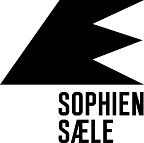
International exchange through KAMS
Table 3
Language: English
Host: Michelle Lee (Program Coordinator / International Relations Headquarters, Korea Arts Management Service)
About our international performing arts marketing platform (PAMS), international market development (Center Stage Korea, Resonance Korea, Journey to Korea Music, Into the Light), funding for international exchange (ARKO-PAMS Grant, Funding for Center Stage Korea, KAMS-EFWMF Tour Grant, KAMS Connection), exchange in the Korean contemporary arts community (Project ViA), arts professionals’ training (Next Expert Training / NEXT) and cooperative program with Korean cultural centers (K-Arts Tour Program).
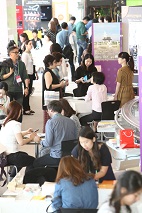
Presentation celebrating the establishment of Theater Explorers Association (TEXAS)
Table 2
Language: Japanese(English documentation available)
Host: Yuta Odashima(Theater Explorers Association(TEXAS))
Theater Explorers Association (TEXAS) was established in 2015 as a base for initiatives that aim to research, develop and support in the vacuum area of performing arts. Celebrating the establishment, we would like to introduce the visions and mission of TEXAS.

2.11 Wed 14:10-14:40
The Liaison Council of Public Theaters and Concert Halls in Japan
Room
Language: Japanese with English interpretation
Host: Jun Mano (President), Hiroshi Takahagi (Secretary General), Masato Kishi (Secretariat)
The Liaison Council of Public Theaters and Concert Halls in Japan is a nationwide network organization formed by about 40 local public theaters and music halls, most of which are supported by the Agency for Cultural Affairs’ project for revitalization of theaters and music halls. In order to facilitate creation, dissemination and international exchange, it shares tasks such as cooperation with arts organizations, co-production, personnel training and supporting system, seeks solutions and advocates. We would like to introduce the roles and activities of the network to those who work at public theaters or arts organizations as well as international presenters who are interested in bringing their projects to Japan.

Enjoy perfoming arts together! -Ensuring access to performing arts for the disabled, deaf and hard of hearing audiences
Table 1
Language: Japanese and Japanese sign language
Host: Hirokawa Asako (Theatre Accessibility Network)
“Let’s enjoy a performing arts together” We, Theatre Accessibility Network (TA-net), are working with an aim to support every audience with disabilities, including deaf and hard of hearing, to enjoy performing arts. In this session, we will talk about our “Performing Arts Access Information,” a special website launched in July 2014, along with our activities. We are looking forward to sharing our idea on how to include every audience in theatre.

Art and philanthropy
Table 2
Language: Japanese with English interpretation
Host: Mikako Atsuchi (Nonprofit Organization Acchi Cocchi)
Nonprofit Organization Acchi Cocchi aims for philanthropy through art including music, fine art and butoh and support for young artist, organizing concerts and events with a focus on exchange through art. We have been holding a café concert by young musicians at temporary housings or meeting spaces monthly, since August 2011, as a project for supporting the Great East Japan Earthquake stricken areas. Introducing the project, we would like to discuss and exchange around the idea of art that can accompany daily lives and how artists can be involved in it.
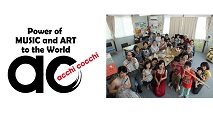
Iranian Traditional Drama
Table 3
Language: English
Host: Majid Sarsangi (Associate Professor, University of Tehran)
Iran, like other countries which have long history and old civilization, has had many traditional and ritual dramatic performances. In other word, drama and performance, especially ritual and religious performances were part of Iranian life. In the absence of formal theatre places, those performances took place in different parts of cities. Bazaars, squares, tea-houses, religious and sacred places like mosques. shrines and cemeteries and even privet houses were among those places which were used for Iranian traditional and religious performances. According to Iranian culture and art history, there has been various traditional and religious performances. The most important of them are: Taziyeh (passion play), Dance-Dramas, Dramatic Story-telling, Ro-Houzi (Comic Play), Kheimeh-shab-Bazi (Puppt Theatre) and Carnival Plays. Some of these performances could be still seen in different part of Iran but some of the are replaced with modern performances. In this meeting I will try to give more information about traditional and religious drama in Iran and also the current situation of Iranian theatre.
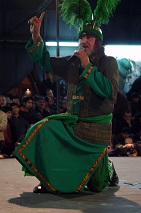
Hip Hop – Contemporary – Vietnam Tradition
Table 4
Language: English
Host: Thanh Nguyen Duy (J-Buddha)
I was originally start my career as a street dancer so obviously it is my main dance style. However, I do want to keep developing my dancer career by mixing up the art of street dance and the contemporary dance altogether. Because in the future, in particularly, I truly want to express Vietnamese traditional and culture in my dance style and my performances. I hope to meet new people and be able to share experiences as well as to recieve ideas / feedbacks to continually contribute and help adding more towards Vietnamese dance.
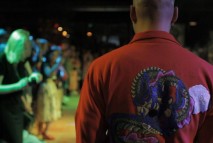
2.11 Wed 14:50-15:20
NOVOFLOT experimental music theater from Berlin
Room
Language: English with Japanese interpretation
Host: Sven Holm (NOVOFLOT)
NOVOFLOT is an independent opera company based in Berlin. The company is focusing on new ways of production and innovative concepts in music-theatre. With ever-changing singers, musicians and actors it surprises audience by its unique experimental hybrids formats. In 2014 NOVOFLOT has been awarded with the First Prize of George Tabori Prize. Sven Holm, one of the founders and director introduces its activities by videos.
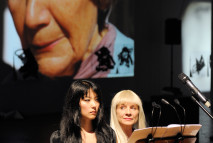
Theatre in the ancient capital Nara
Table 1
Language: Japanese
Host: Nami Kitahashi (EVENT-STATION.)
There is no cinema in the biggest city in Nara prefecture. Osaka and Kyoto are close, and it is easy to work and shop outside of the prefecture. We would like to talk about the current situation of theatre in Nara and think about the future of the area.
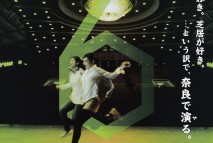
Domestic migration
Table 2
Language: Japanese
Host: Masashi Nomura (Okinawa Prefectural Foundation for cultural promotion, Komaba agora theater, Seinendan ..etc.)
The host, who has moved to Naha, Okinawa and has been going back and forth between Okinawa and Tokyo since last October, would like to talk about the reason why he moved and the changes he has experienced and informally discuss migration of performing arts managers and artists with those who have moved or are interested in moving. The topic for this table is domestic.
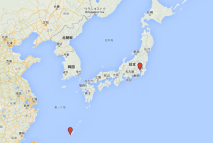
A base for creation and dissemination of performing arts in Tama: the aims of Tachikawa Culture Factory
Table 3
Language: Japanese
Host: Koji Kurasako, Shigeya Yo (Tachikawa Culture Factory)
“Tachikawa Culture Factory,” refurbishing an abandoned school in Tachikawa City, Tokyo, opens in August 2015 and will be in full operation in October. Aiming to revitalize performing arts culture in Tachikawa and Tama area that surrounds the city, the Factory plans to develop an environment for creation and disseminate workshops and performances. We would like to introduce the projects and activity plans of Tachikawa Culture Factory, and explain how to use our shared office and rental space and the application schedule, to groups that are interested in using the Factory as their office or space for rehearsal and workshop.
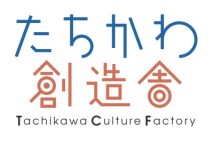
2.11 Wed 15:30-16:00
Explat, an intermediary for personnel training and work environment improvement
Room
Language: Japanese with English interpretation
Host: Yuko Uematsu, Kenta Fujiwara, Ayumi Nakagawa, Naoko Hasuike(Explat)
There are a lot of problems that those who engage in performing arts management need to tackle in order to be able to be proud of their work, maintain their mental and physical health and make their engagement a lifework. We establish an intermediary for personnel training and labor environment improvement called “Explat” (currently in preparation for registration as a nonprofit organization) to work on related issues in a long term.
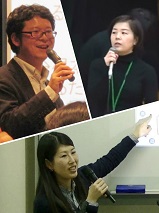
The reason why “mamagoto” stays in Shodo Island
Table 1
Language: Japanese
Host: Takuo Miyanaga (mamagoto | ZuQnZ)
Theatre company “mamagoto” has continually been working in Shodo Island since their participation in Setouchi International Art Festival in 2013. They stay in a small port town where there is no theater and create “theatre that can be made only then, there and with them” involving local people and tourists. They feel that there is new possibility of theatre in this creation process. In this group meeting, we would like to talk about the activities of “mamagoto” in Shodo Island and their prospects.
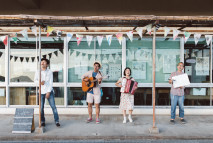
Photo: Hideaki Hamada
Possibility of connecting the street (performance) and theaters
Table 2
Language: Japanese
Host: Kamimaro (ASAKUSA performance place)
We have been exploring the possibility of the city, theaters and street performance since 2010. To have performing arts flourish again in the Sixth District of Asakusa, the area that used to be the biggest show business area in Japan, we seek liaison between shopping districts, theaters, streets and street performance to revive the city. We would like to talk about our approaches and activities in the four years, companies’ advantages and disadvantages of going out to the street, and proposals for making theaters cultural platforms in the city and to present the possibility of new methodologies and culture that make use the street to those who are involved in city planning, theaters and companies.

Performing Arts in Brunei Darussalam – Audience Development
Table 4
Language: English
Host: Shahminan Yasin (Culture and Arts Section, Ministry of Culture, Youth and Sports)
The Senandong Budaya was established in 1985, a year after Brunei Darussalam became an independent sovereign nation based on the philosophy of the Malay Islamic Monarchy (Melayu Islam Beraja). It is a philosophy of tolerance, which allows other culture to follow individual traditions and to practice other religions. Under the auspicious of the Culture and Arts section in the Ministry of Culture, Youth and Sports, the troupe had achieved great success in the fields of teaching, propagating, promoting, developing, refining and researching all aspects and facets of the Culture of Brunei as a promotion to regional and international understandings. The troupe also plays its vital role in promoting and preserving the Arts by organizing competitions, seminars, workshops, symposia or forum of its kind as a turning point to a more systematic approach and to expose hidden talents and potentials.
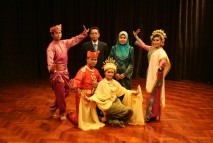
2.11 Wed 16:10-16:40
The Personal and the Political: Five Arts Centre’s Response to Contemporary Malaysia.
Room
Language: English
Host: June Tan (Five Arts Centre)
Five Arts Centre is a 14-membered performing arts collective based in Malaysia that celebrated its 30 year anniversary in 2014. Contemporary social and cultural issues impinging on Malaysian life are precipitated by the collective by way of exhibitions, performances, talks, and creative and research workshops. This meeting will present Five Arts Centre’s underlying creative practice within the context of socio-politics climate of Malaysia, and will also touch on working as a performing arts collective.
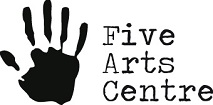
What problems and concerns do the performing arts managers have now?
Table 1
Language: Japanese
Host:Yuko Uematsu, Kenta Fujiwara, Ayumi Nakagawa(Explat)
An intermediary for performing arts managers’ personnel training and labor environment improvement called “Explat” (its activities are introduced in a group meeting on February 11 at 15:30) carries out various activities and projects to have the managers proud of what they do, maintain their mental and physical health and continue their engagement as their work. We would like to have this meeting to widely exchange thoughts with those who are at work and students who wish to have a job in this sector and to share the current problems and concerns.

The youth theatre creation in China and Beijing Fringe Festival
Table 3
Language: Chinese with Japanese Interpreter
Host: Shao Zehui (The Beijing Fringe Festival)
The Beijing Fringe Festival was established in 2008. With the purpose of nurturing young theatre talent, introducing outstanding theatre work by young people, promoting the development of a flourishing theatre scene in China. Fostering international exchange among young theatre practitioners. Since 2008, the Beijing Fringe Festival has launched many young practitioners of exceptional talent and presented a large selection of excellent original works. Beijing Fringe Festival has the aim to provide an international theatre platform. To showcase best experimental theatres and dances to Chinese audiences. To encourage cultural exchange within worldwide theatre organizations.
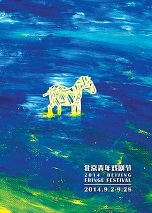
Beyond Pressure Festival
Table2
Language: English
Host: Moe Satt (Beyond Pressure Festival)
‘Beyond Pressure’ is an independent art festival created to contribute towards the expanding of Myanmar-Art boundaries.It’s initiated and run by local artists who work in their communities to create projects that open-up spaces for self-expression and discourse. It’s one of the most significant as well as the well known art festival in Myanmar.Festival is now going forward to a new era to bridge the various art forms to take space in public and work more closely into people and would like to create unique platform for the cultural promotion and exchange among the artists and collectives from
the region.
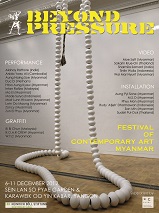
2.12 Thu 11:30-12:00
Social Activism & Performing Arts Festival – NPN Idea Forum in Japan Vol.2
Room
Language: English with Japanese interpretation
Host: Ron Berry, Executive Artistic Director of Fusebox; MK. Wegmann, President and CEO of National Performance Network/Visual Artists Network
Ron Berry, Executive Artistic Director of Fusebox, will introduce the annual hybrid art festival that takes place in Austin, Texas every April. He will talk about the ways in which social inclusion and cultural equity are addressed through the Festival and its partnership regarding “thinkEast”. “thinkEast is a large scale long term project to transform former Austin tank farm and provide affordable living and working environments for Austin’s creative community.
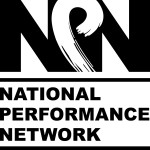
Bangkok Theatre scene right now: Spaces Artist and Collaboration
Table
Language: English
Host:
Dr.Parichat Jungwiwattanaporn, Dean of the faculty of Fine and applied art, Thammasat University
Mr.Thanapol Virunhakul, co artistic director of Democrazy Theatre Studio and the Producer of Bangkok Theatre Festival
Ms.Pavinee Samakabutr, co artistic director of Democrazy Theatre Studio and the Producer of Bangkok Theatre Festival
Mr.Wasurat Unaprom, independent artistic director, co producer of Thong Lor Art Space Bangkok and a member for Bangkok Theatre Festival Producer team.
In last 5 years, the theatre and performing arts in Thailand have been grown up rapidly with much more number of audience increasing number of production, more than 48 productions a years including the new born art venue in Bangkok and, now, it has become the pool of talented contemporary artist. The meeting aim to present the theatre and contemporary performance scene in Bangkok to allow the participant getting to know the art venues, artists, producer including artist in residency possibility that very active now and looking for the chance of exchange the artist and collaboration work together.
This would be the opportunity to lead the participant to the gateway of Art community in Thailand .
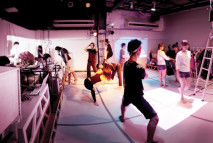
Presenting inclusive interactive visual art to the widest audiences in public spaces
Table 1
Language: English
Host: Mado Ehrenborg (Architects of Air) , Jason Cross (Insite Arts)
Architects of Air create and tour luminaria monumental inflatable sculptures that people enter to encounter the wonder of light. Once inside visitors can happily lose themselves in a dazzling maze of winding paths and soaring domes. A luminarium is perhaps the most accessible of art-forms to be found in a public space, appealing to the widest audience. It is a highly visible centrepiece to a festival or a venue, and is enormously photogenic and attractive to media. Luminaria are versatile, their modularity adapts to different sites and they can also be used for performance, workshops and educational experiences. Over 3 million visitors in 41 countries on 5 continents have immersed themselves in the spectacular radiance of a luminarium since the company began touring in 1992. We invite TPAM attendees discover more about the amazing experience of hosting and presenting a luminarium.
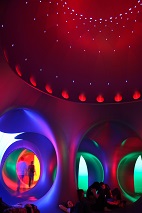
Subsidy Program of Arts Commission Yokohama
Table 3
Language: Japanese
Host: Miki Ikejiri (ACY Coordinator, Yokohama Creativecity Center [Yokohama Arts Foundation])
Arts Commission Yokohama supports culture and art to encourage activities of the artists and creators in Yokohama. We would like to introduce our subsidy for cultural and artistic activities in the downtown area of Yokohama, a guideline and the application method of the program. Please come and join us if you consider working in Yokohama.
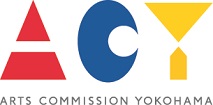
2.12 Thu 12:10-12:40
Social Activism & Performing Arts Festival – NPN Idea Forum in Japan Vol.2
Room
Language: English with Japanese interpretation
Host: Ron Berry, Executive Artistic Director of Fusebox; MK. Wegmann, President and CEO of National Performance Network/Visual Artists Network
This is the second half of the session under the same title to continue the discussion regarding ways to address social inclusion and cultural equity issues through performing arts projects. M.K. Wegmann, President and CEO of National Performance Network/Visual Artists Network (NPN), will also make a brief presentation regarding disaster relief efforts and preparedness in the arts field, introducing such efforts and resources as “transforma” and “ArtsReady” a program of South Arts.* Two additional NPN partners, who are attending TPAM, will join the discussion as well.
*There is a separate public round-table forum organized as NPN Idea Forum in Japan Vol. 1, which is dedicated to discuss disaster preparedness and relief efforts in the arts from 3pm to 5pm on February 11th at the Conference Room of the Doll Museum. For more information on the Idea Forum Vol. 1 : kyoko@usjapanctn.net; Access information to Doll Museum

Open call for the 2016-2017 season in a hot spring town: residence and studio are free of charge, and hot spring is offered for 100 yen per day
Table 2
Language: Japanese with English interpretation
Host: Yoko Nishiyama (Kinosaki International Arts Center)
We invite you to come to the arts center in Kinosaki, a beautiful town of rich nature and Japanese traditional culture which is highest rated in the Lonely Planet. If you apply for our program and are selected as a resident artist, you can use our residence that hosts 22 people at the maximum, six studios that are available for 24 hours and a hall for free. Our concept about the relationship with the world and region has changed, which we would like to talk about at this table.
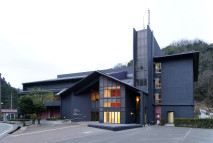
Tea ceremony theatre Jukou’s IORI and what it is to internationally tour
Table 1
Language: Japanese(and English in compliance with participants’ wishes)
Host: Junko Uemura (Eisei Theatre Group)
We would introduce Eisei Theatre Group’s piece that combines tea ceremony and theatre Jukou’s IORI. We have been planning to tour this piece internationally after 2015, and that have made us re-question what it is to internationally tour. We would like to discuss what it means to perform oversea, and the meaning of connection between artists, audience and professionals regardless of where that happens.
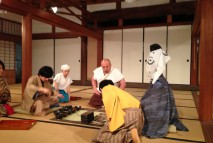
Theatre in Laos
Table 4
Language: English (Interpreted from Lao)
Host: Lattanakone Insisiengmay (Director, khaoniew theatre groupe), Kiritin Norath (English interpreter)
A presentation of the theatre and film industry in contemporary Lao PDR, represented by local theatre company ‘Khao Niew Lao’. Khao Niew Theatre will present the company background, history and their current work in Laos and the wider Asian region. In addition to this, a representative from the local film industry will present a small insight into contemporary Lao film.
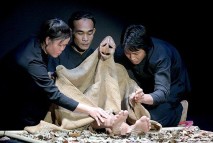
2.12 Thu 12:50-13:20
Real Reality, the latest work by Nibroll, a Japanese dance company
Room
Language: Japanese with English interpretation
Host: Masanori Okuno (precog)
I would like to introduce Real Reality, the latest work by Nibroll that was just premiered in Tokyo in January 2015, with a video excerpt. This work aims to explore and present the body that we, who live in the present time where reality has become vague, can “feel.” Residence, creation and workshop were carried out in Wakayama, Aichi and Tokyo in 2014, and more than 80 local creators and artists contributed to the piece. We intend to deepen the work through continuing workshop and creation in various places.
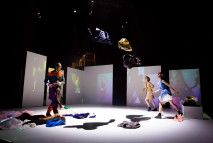
Photo: Hideto Maezawa
The Performing Arts Scene in Catalonia – Spain
Table 1
Language: English, Spanish
Host: Ribalta Mike (Director International Relations, FiraTàrrega – Performing Arts Market of Catalonia)
A meeting to explain the performing arts scene of the region of Catalonia. The main festivals and events in performing arts (theatre, street theatre, dance, circus, young audiences) of Barcelona. A meeting opened to all questions regarding the performing arts in Spain (how to collaborate, support programs, main companies and events).
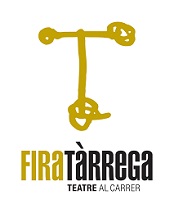
About Festival/Tokyo
Table 2
Language: Japanese with English interpretation
Host: Sachio Ichimura, Hirotomo Kojima( Festival/Tokyo)
Festival/Tokyo, which started in 2009, is an annual international performing arts festival held mainly in Ikebukuro area in Tokyo. As a festival of contemporary theatre and dance that represents Tokyo and Japan, it invites excellent foreign performing arts works and produces international co-productions and new works by diverse Japanese artists. At this table, we would like to talk about the outline of the festival, its history and past programs.
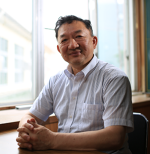
Gogol Center meets Asia
Table 3
Language: English
Host: Tatiana Azova, deputy managing Director of Gogol Center (Moscow, Russia)
Gogol Center reaching out to like-minded modern Asian theaters and festivals for collaborations. Gogol Center does not limit itself with any genre boundaries and constantly strives to reflect Modern Art in the most relevant way. A dynamic space where global art trends are in contention with the individuality of each creator. A modern theater for everybody who wants to be in.
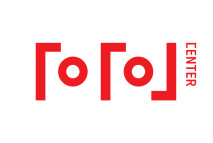
2.12 Thu 13:30-14:00
Recent activities and productions in process by chelfitsch / Toshiki Okada
Room
Language: Japanese with English interpretation
Host: Nana Koetting (precog)
The theatre company “chelfitsch,” led by Toshiki Okada, has presented their works in more than 70 cities in the world. I would like to introduce Super Premium Soft Double Vanilla Rich, a 2014 work that has toured 16 cities, and Okada’s first installation work that was premiered at Museum of Contemporary Art Tokyo, as well as the latest two works that are to be created in 2015.
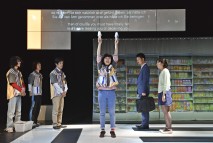
Photo: Christian Kleiner
The reason why “mamagoto” stays in Shodo Island
Table 1
Language: Japanese
Host: Takuo Miyanaga (mamagoto | ZuQnZ)
Theatre company “mamagoto” has continually been working in Shodo Island since their participation in Setouchi International Art Festival in 2013. They stay in a small port town where there is no theater and create “theatre that can be made only then, there and with them” involving local people and tourists. They feel that there is new possibility of theatre in this creation process. In this group meeting, we would like to talk about the activities of “mamagoto” in Shodo Island and their prospects.

Photo: Hideaki Hamada
Asia Series of Festival/Tokyo
Table 2
Language: Japanese with English interpretation
Host: Sachio Ichimura, Chika Kawai(Festival/Tokyo)
We would like to introduce our Asia Series that newly started last year co-organized with The Japan Foundation. In Asia, various languages, religions and cultures coexist, and each country and region has its own rich diversity. This series selects one country each year, and through continual local research by the festival’s staff in cooperation with national and international network, introduces artists who create contemporary performing arts works and the art environment of the country. Last year we focused on Korea and Korean “dawon” arts, and we have been researching Myanmar, Malaysia and other countries. We appreciate opinions and thoughts about future possibility and tasks of this series from those who are interested in it.

International exchange through KAMS
Table 4
Language: English
Host: Michelle Lee (Program Coordinator / International Relations Headquarters, Korea Arts Management Service)
About our international performing arts marketing platform (PAMS), international market development (Center Stage Korea, Resonance Korea, Journey to Korea Music, Into the Light), funding for international exchange (ARKO-PAMS Grant, Funding for Center Stage Korea, KAMS-EFWMF Tour Grant, KAMS Connection), exchange in the Korean contemporary arts community (Project ViA), arts professionals’ training (Next Expert Training / NEXT) and cooperative program with Korean cultural centers (K-Arts Tour Program).

Support Manila!: Sipat Lawin Ensemble and Audience Engagement in the Philippines
Table 3
Language: English
Host: JK Anicoche and Sarah Salazar (Sipat Lawin Ensemble)
Sipat Lawin Ensemble is an edge-work, site-specific, contemporary performance company based in Manila, Philippines. Since 2010, the Ensemble has been generating new audiences for the local performance community through creating possibilities for further interactivity and participation. In this meeting, we will be sharing experiences on multi-field integration, cross-cultural collaborations, community development, sustainability, the Blank Ticket concept, and KARNABAL: A Def. Defying Festival, the Ensemble’s international development laboratory for performance and social innovations.
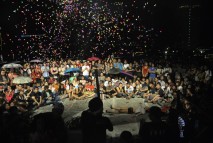
2.12 Thu 14:10-14:40
Aichi Triennale 2016
Room
Language: Japanese with English interpretation
Host: Eri Karatsu (Aichi Triennale Executive Committee)
Aichi Triennale, an international contemporary arts festival that also features performing arts including dance, theatre and opera, is held for the third time in 2016. We would like to introduce the programs of the past two editions and the plan for the third edition.
○Artistic Director: Chihiro Minato
Photographer / Writer, Professor in visual anthropology, Tama Art University
○Theme: Homo Faber: A Rainbow Caravan
○Period: Summer–Autumn 2016
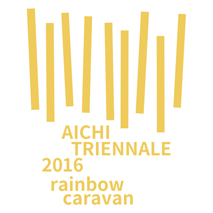
Next’s Personnel training program for young performing arts managers
Table 1
Language: Japanese
Host: Kenta Fujiwara (NEXT)
Next Performing Arts Management School has been training young performing arts managers together with experienced performing arts managers from diverse backgrounds with practical skills, reflection on mentalities and network building as the main concepts. At this table we would like to introduce our programs, especially a seminar that starts on February 24 to offer training of English expressions focusing on international performing arts frameworks and the grounds of performing arts management, as well as our future plans.
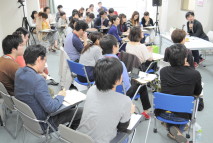
Sustainable Thinking for the Dance Field
Table 2
Language: English
Host: Katarina Lindholm (Project Manager, Dance Info Finland)
How could the field of dance and other performing arts become more sustainable? Dance Info Finland has explored this question by running a Sustainability Think Tank during 2012-2014, as part of the Nordic-Baltic keðja collaboration. Project Manager Katarina Lindholm will share the results of the Think Tank and talk about sustainable thinking in the field of dance, in terms of e.g. funding, mobility and support structures.

The activities of Open Network for Performing Arts Management (ON-PAM)
Table 3
Language: English
Host: Kei Saito (board member, Open Network for Performing Arts Management (ON-PAM))
Open Network for Performing Arts Management (ON-PAM) is a nationwide and international membership network in which individual “performing arts managers” who connect artists / arts organizations and audience through their social activities participate. Prior to the reporting session and plenary meetings on February 13, we would like to discuss topics such as how to raise awareness of the social roles of performing arts or advocacy regarding cultural policy, which have been the focuses of ON-PAM, together with non-members and those who are considering admission.

A meeting in TPAM turned out Bosnia and Italy tour of 5 cities.
Table 4
Language: Japanese with English interpretation
Host: Luisa Zuffo, Kana Hayashi, Miwa Monden (MUM&GYPSY)
With the aim at presenting and promoting in Europe, the very new artistic language and the innovative theatre style of the director Takahiro Fujita, his company mum&gypsy and five European organizations have joined to organize a tour. During creation along with an activity of workshops for actors, director Takahiro Fujita and mum&gypsy presented in 5 different cities.
At this meeting, we will travel through the path that led mum&gypsy to present their work in Bosnia and Italy collaboration with Fabbrica Europa Foundation established after a meeting in TPAM 2013 and unveil how mum&gypsy and their work were acclaimed by the audience and the workshop performers.

2.12 Thu 14:50-15:20
Kanagawa Arts Theatre’s Educational projects for international touring
Room
Language: Japanese with English interpretation
Host: Bunichi ITO,Hiromi ISHII (Kanagawa Arts Theatre)
Kanagawa Arts Theatre, which has entered the fifth year since its establishment, not only creates performing arts works but also works on educational projects and produces unique contents that are accessible to a wide range of generations. In this meeting, among the educational projects, we would like to introduce “Japanese Traditional Music Workshop ‘Let’s Add Sound to a Story’” and “Participatory Mystery Game Theatre ‘KAAT the Tour’” that are available for international touring. We welcome participation of those who work on educational programs at oversea theaters.
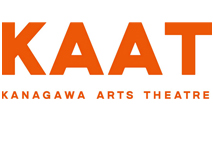
Activities of ITI centres and the Japanese centre
Table 2
Language: Japanese
Host: Shuji Sota (Japanese Centre of International Theatre Institute)
International Theatre Institute ITI consists of more than eighty centers globally. They promote world events such as World Theater Day or International Dance Day while contributing to the area of performing arts education these days. At the TPAM Exchange Group Meeting, we will discuss those activities conducted by world ITI centres and also raise public awareness of the Japanese centre, which has founded Uchimura Prize and produced Theatre Born in Conflict Zones.
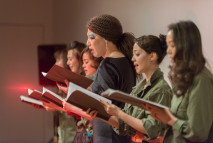
The activities of Open Network for Performing Arts Management (ON-PAM)
Table 1
Language: Japanese
Host: Satoshi Kawaguchi (board member, Open Network for Performing Arts Management (ON-PAM))
Open Network for Performing Arts Management (ON-PAM) is a nationwide and international membership network in which individual “performing arts managers” who connect artists / arts organizations and audience through their social activities participate. Prior to the reporting session and plenary meetings on February 13, we would like to discuss topics such as how to raise awareness of the social roles of performing arts or advocacy regarding cultural policy, which have been the focuses of ON-PAM, together with non-members and those who are considering admission.

Visual theatre exchange
Table 3
Language: English
Host: Anne Jämsä (Artistic Co-Director, WHS contemporary circus & visual theatre )
WHS creates visual theatre, mixing contemporary circus with cinema, dance, puppets and visual arts. WHS productions have toured internationally in 40 countries worldwide. We have just opened WHS Teatteri Union, a new stage for visual performing arts in Finland. We would like to explore possibilities for mutual international performance exchange between companies and venues.
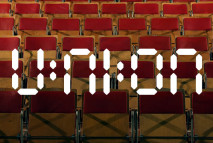
Indonesia’s Contemporary Performing Arts: Performing Diversity, History and Social Reality.
Table4
Language: English
Amna Kusumo (founder and director of Kelola Foundation, which has been nurturing Indonesian performing arts since 1999 through its programs) together with Helly Minarti (dance scholar and Indonesian Dance Festival artistic director) and Yudi Tajudin (artistic director of Teater Garasi) will present the latest situation of Indonesia’s performing arts. They will also speak about how Indonesia’s diverse traditions, cultural history and dynamic social realities have continued to become the rich and productive platform for intercultural collaborative projects.
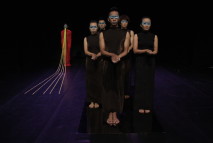
2.12 Thu 15:30-16:00
Strengthening Asian ties: The Japan Foundation Asia Center
Room
Language: Japanese with English interpretation
Host: Momoko Ouchi (The Japan Foundation Asia Center)
In April 2014, based on the Government’s new cultural policy “WA Project” Toward Interactive Asia through “Fusion and Harmony,” The Japan Foundation Asia Center was established. Aiming to develop the awareness of sympathy and coexistence as neighbors among people who live in Asia, we have started activities for creating opportunities for exchange and cooperation in various fields including performing arts. We would like to introduce the project policies and activities of the Center.
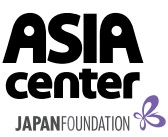
About the Grant Programs of The Saison Foundation
Table 1
Language: Japanese
Host: Tatsuo Fukutomi (The Saison Foundation)
A meeting on the grant programs of The Saison Foundation, which supports contemporary Japanese theater and dance by awarding grants and offering space for creation at Morishita Studio in Tokyo. At this table, we will explain about our Saison Fellows, Sabbatical, Creative Environment Improvement, and International Project Support Programs.We look forward to your participation.
![]()
Intervention in Theatre
Table 2
Language: Japanese with English interpretation
Host: Noriyuki Kiguchi (Akumanoshirushi)
An introduction to the activities of Akumanoshirushi and discussion on the relationship between theaters that place orders, artists that receive the orders, and audience. The keywords are “regional art,” “participatory art” and “designing of audience’s experience.”
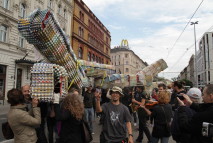
搬入プロジェクト #16 ブダペスト, 2014
Post-performance talk isn’t enough! A proposal of “World Cafe” that deepens theater goers’ experience
Table 4
Language: Japanese
Host: Takayuki Hiramatsu (Facilitator, A Workshop Camp for Reflecting on Society and Art from Shizuoka / Theatre Gekidan Urinko)
Have you ever thought, “I want audience to appreciate shows more thoroughly,” “I want more opportunities than questionnaires and social networking services to hear what they thought,” or “I want a space where audience that came to the same show talk with each other”? At this table, I would like to talk about the methodology, effects and training of the strategy called “World Cafe,” which any company or theater can employ for a low cost, introducing the example of Shizuoka Performing Arts Center (SPAC).
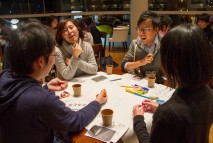
2.12 Thu 16:10-16:40
About ACC fellowship program
Table 1
Language: Japanese
Host: Ritsu Yoshino (Asian Cultural Council (ACC))
ACC’s fellowship program was founded in 1963 to support the international cultural exchange through artists and art professionals in the United States and Asian countries. We would like to introduce the outline of this fellowship grant and the experience through the program.

The activities of quinada.inc / Works of hi-bye and SAMPLE
Table 2
Language: Japanese with English interpretation
Host: Miyoshi Sachiko (quinada.inc)
quinada.inc has consistently been managing artists, producing theatre works and supporting trainings of managers since its establishment in 2004 aiming for “happiness accompanied by theatre.” Focusing on the works of hi-bye (director: Hideto Iwai) and SAMPLE (director: Shu Matsui), we would like to introduce our activities.
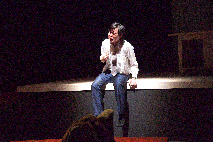
The supporting projects of The Japan Foundation
Table 4
Language: Japanese
Host: Koji Sato (The Japan Foundation Asia Center), Masashi Beppu (The Japan Foundation)
We would like to introduce the features and application guidelines of our new supporting programs designed for Asia (Grant Program for Enhancing People-to-People Exchanges, Grant Program for Promotion of Cultural Collaboration, and The Asia Center Fellowship Program) that were launched upon the establishment of The Japan Foundation Asia Center in April 2014 as well as existing programs (Grant program for Dispatching Artists and Cultural Specialists and Performing Arts Japan) that are not only for Asia but also for other areas of the world.

The supporting projects of The Japan Foundation
Table 3
Language: English
Host: Mitsuhiro Inada (The Japan Foundation Asia Center), Masashi Beppu (The Japan Foundation)
We would like to introduce the features and application guidelines of our new supporting programs designed for Asia (Grant Program for Enhancing People-to-People Exchanges, Grant Program for Promotion of Cultural Collaboration, and The Asia Center Fellowship Program) that were launched upon the establishment of The Japan Foundation Asia Center in April 2014 as well as existing programs (Grant program for Dispatching Artists and Cultural Specialists and Performing Arts Japan) that are not only for Asia but also for other areas of the world.





